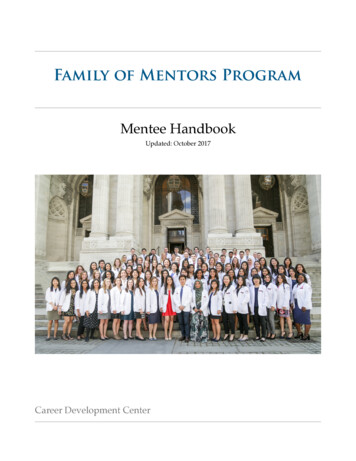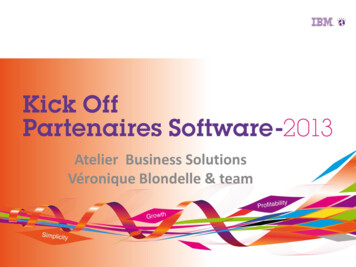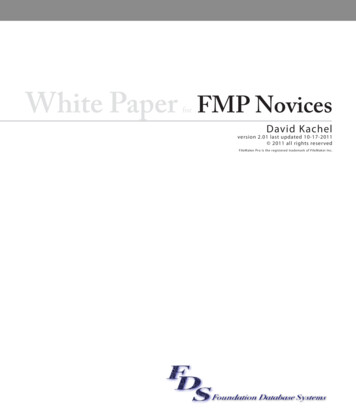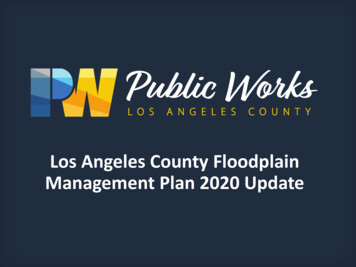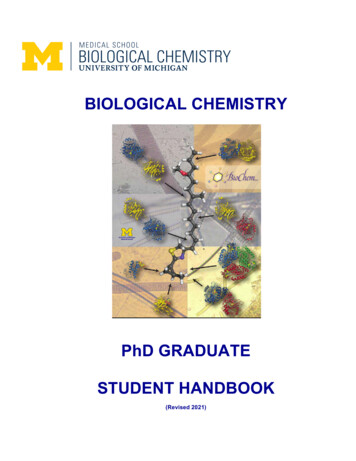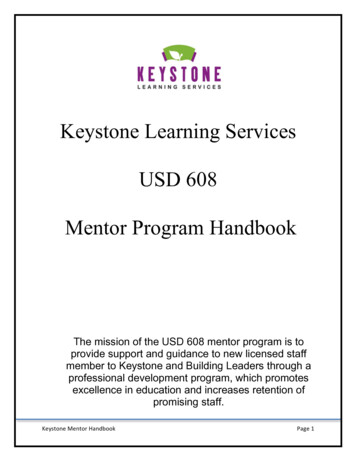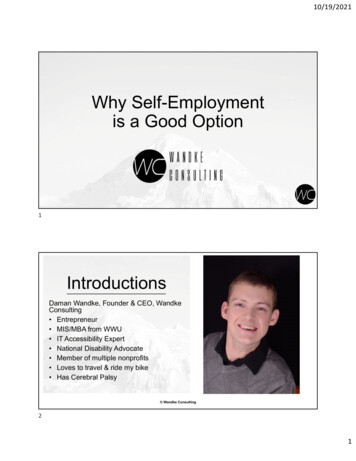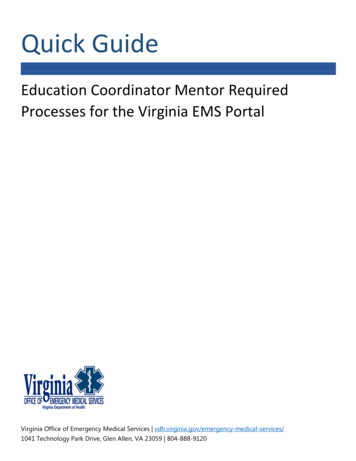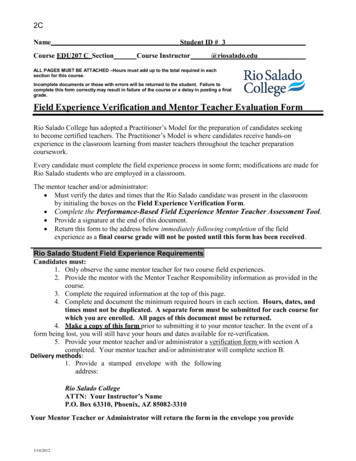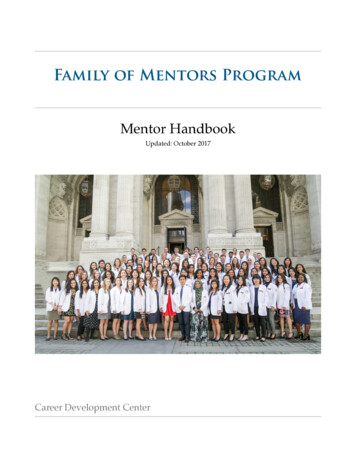
Transcription
Mentor HandbookUpdated: October 2017Career Development Center
Welcome to Family of Mentors! .3FMP Description .4FMP Mission .4FMP Goals .4Mentors .4Matching .5Duration of the Mentor-Mentee Relationship .5Ending the Mentor-Mentee Relationship .5FMP on the SUNY Eye Network .5Mentoring Workflow .6Mentoring Agreement .7Goal Setting .7S.M.A.R.T. Goals .8Examples of S.M.A.R.T. Goals for Mentees .9Exploratory Questions .9Discussion Prompts and Resources .9Mentor-Mentee Tips .10Mentor of the Year .12
Welcome to Family of Mentors!Welcome to the SUNY College of Optometry Family of Mentors Program (FMP)! This isa signature program of the Career Development Center (CDC) and it was developed tomeet the College’s strategic goal to provide students, residents and alumni with theservices to succeed in their career. Your decision to participate in the development ofour student body is one I hope you find rewarding and worthwhile.Mentoring relationships have been shown to be transformative especially for studentsnavigating medical educational programs. As an optometry student, your mentee facesa rigorous course load and challenging clinical rotations along with extra-curricularactivities that leaves little time for the ever-important relationship building with amentor. Moreover, our students hail from all parts of the country and from othercountries. Thus, FMP was developed to overcome these these challenges and meet theneed of connecting students and residents to caring professionals.As a mentor you will have the opportunity to advise, guide and share your experienceswith your mentee as she navigates through her educational path. Your mentee willneed to make a number of decisions important to his career development from decidingwhether to pursue a residency to choosing externship sites and will need guidance andsupport. But, just as importantly, your mentee will be developing soft skills such ascommunication, leadership, and time management to just name a few, which as amentor, you will be an integral part in shaping and refining.The benefits of mentoring are not solely for the mentee. As a mentor you can expect tobuild your communication and leadership skills as you work with your mentee throughher career development. Additionally, you may find opportunities to build yourcoaching, counseling and motivating skills.Ultimately, participating in FMP is an investment in the development of a futurecolleague and I’d like to thank you for your generosity.Sincerely,Quy H. Nguyen, O.D.Director of Career Development and Minority Enrichment
FMP DescriptionFMP is an online and in-person program developed to enhance students’ and residents’personal, academic, and career development and to expand professional networks forstudents, residents and mentors. FMP seeks to capitalize on the vast network of SUNYalumni, professional organizations and partners from which to recruit the most talentedmentors to develop our outstanding student body.FMP MissionThe mission of FMP is to connect students of optometry and residents with mentors in orderto foster a trusting and long-lasting relationship that helps to develop students and residentspersonally, academically and professionally and allows the mentors opportunities to sharewisdom and expertise, develop interpersonal communication, motivation, coaching,counseling, and leadership skills, and build professional networks.FMP Goals1. Establish strong relationships between students and residents and mentors that lastbeyond matriculation at SUNY Optometry2. Enhance students’ and residents’ career development3. Increase students’ and residents’ overall experience and satisfaction at SUNY-Optometry4. Provide a meaningful avenue for alumni, professional organizations and partners to stayconnected with SUNY OptometryMentorsFor the first time ever, we will be leveraging SUNY Optometry’s very own alumni network,the SUNY Eye Network (www.sunyeyenetwork.org), to seek mentors. This platform wascreated uniquely to allow alumni to stay connected to the College, as well as offer alumni anopportunity to work with students and residents.
MatchingThe mentor-mentee relationship will be established mutually between the mentor and thementee. Mentees will be allowed access on the SUNY Eye Network, search for a mentor thatfits their needs, and send a request that way.Mentees may request up to 2 mentors at a time, but it is up to you, the mentor, to pick thestudent that you’d like to work with. Once you accept a request, and decline all others, thiswill trigger the start of your mentor-mentee relationship!Duration of the Mentor-Mentee RelationshipThe mentor-mentee relationship is for one year, ending at graduation for our 4th years inusually late May. At that point, if the mentee will be a student the following year, and yourrelationship is going well, your mentee may ask you to extend the mentorship. Ultimately,our goal is to create long-lasting relationships that extend the duration of professionalcareers (but not in an official mentorship capacity like this).Ending the Mentor-Mentee RelationshipAs in any relationship, you may experience growing pains and bumps in the road, and theCareer Development Center will be available to facilitate, mediate, and help address issuesthat may arise during your mentor-mentee relationship. Should the relationship, however,reach a point where either the mentor or mentee feel that the relationship is no longerbeneficial, a mentor or mentee may choose to dissolve the mentor-mentee relationship withfacilitation by the Career Development Center.FMP on the SUNY Eye NetworkThe whole program, as mentioned previously, will be implemented on our alumninetworking platform. Within this platform, all the mentor/mentee matches will be placedinto the “Family of Mentors” group so everyone can communicate with one another. Thegroup has a main link to our school website, where all the resources are made available.
Mentoring WorkflowThe workflow consists of 3 phases:Phase 1: Getting to Know Each OtherPhase 2: Delving DeeperPhase 3: ColleaguesPhase 1: Getting toKnow Each Other(30 days)Phase 2: DelvingDeeper(300 days)ReviewMentee/MentorProfileContinue workingtoward establishedgoalsReview mentoringagreement andcreate a schedule ofmeeting days/timesChoose 4-6 questionsfrom ExploratoryQuestions Documentand use as guideEstablish personal,academic and professionalgoalsMeet in-personand/or online at least1hour / monthMeet in-personand/or online at least1 hour/monthRespond toprompts/surveysAttend events &actvities togetherPhase 3: Colleagues(30 days)Mentee GraduatesTransition frommentor-menteerelationship tocolleaguesMentee becomes amentor for a studentor residentMentor takes on anew mentee
Mentoring AgreementThe mentoring agreement will serve as a promise between you and your mentee to fulfill theexpectations and roles of participating in FMP. You and your mentee should review anddiscuss the mentoring agreement at the beginning of your match as indicated in theworkflow chart. The mentoring agreement can be found on our FMP website.Goal SettingSetting goals with your mentee is a great way to help your mentee create a roadmap for thementoring relationship. During Phase 1, you could use this opportunity to discuss the goalsthat your mentee wants to achieve during your mentoring period. Once the goals areestablished, the mentee should track his/her progress and goal achievement periodicallywith you. The goals you and your mentee set should focus on three key areas in yourdevelopment: 1) Personal Goals; 2) Academic Goals; and 3) Career Goals.1) Personal goals are goals related to your mentee’s personal skills or traits. For example,your mentee may want to have a goal to better manage her stress during exams andassessments or improve her conflict management skills. Helping your mentee improve herpersonal skills and traits will prove useful in other areas of her life.2) Academic goals are essential as the professional success of your mentee hinges on hisability to do well in school and gain the clinical skills necessary to pass the Boards and earna license to practice optometry. As each academic year brings new challenges, your mentee’sacademic focus may be overcoming a difficult course or clinical skill development orlanding a coveted externship rotation.
3) Career goals are important for your mentee as he prepares to enter the workforce. Duringher time in school, your mentee will have a chance to explore different specialty areas inoptometry, go to various externship sites and experience different modes of practice. Hiscareer likes and dislikes will begin to be refined with your guidance through theseexperiences. Additionally, your mentee may require help with writing a curriculum vitaeand cover letter, refining interviewing skills, learning how to network or enhancing hisnetwork, etc.S.M.A.R.T. GoalsWhen crafting goals with your mentee, focus on creating S.M.A.R.T. (specific, measurable,attainable, relevant and time-bound) goals. S.M.A.R.T. goals are effective ways to write cleargoals that are time-bound and will hold your mentee accountable. The graphic belowillustrates S.M.A.R.T. goals.
Examples of S.M.A.R.T. Goals for MenteesNot S.M.A.R.T.S.M.A.R.T. GoalWrite a CVWork with my mentor to draft, revise and finalize my CVby the end of the fall semester.Shadow anoptometristBy July, identify an optometrist to shadow in the Queensarea that practices in a health center.Network withmoreoptometristsAttend 2 optometry events this academic year and engagewith at least 3 optometrists at each event and exchangebusiness cards. Follow-up with each optometrist after theevent.Find a jobFind a full-time position in Washington D.C. with an OD/MD practice one month after graduation.Pass OcularDisease 2Study 20 hours per week leading up to the final exam andscore at least an 80%.Be a leaderRun for and win position as NYOSA Trustee nextsemester.Exploratory QuestionsExploratory questions are designed to guide you and your mentee through points ofdiscussion and ensure that your mentee is considering the appropriate career questionsbased on her year in school. Exploratory questions are divided by year; however, questionscan be explored in a different sequence depending on the developmental needs of yourmentee. For example, a first year mentee may be interested in learning about a residencyprogram and a resident mentee may want to examine his values.Discussion Prompts and ResourcesTo increase engagement, periodically, discussion prompts and any relevant personal andcareer development resources will be made available to you and your mentee on the SUNY
Eye Network and our website. They are meant to stimulate dialogue between you and yourmentee.Mentor-Mentee TipsRelationship BuildingEstablishing a strong and trusting relationship with your mentee will take time and effort.The foundation of the relationship should be built on mutual trust and respect. Achievingthis foundation will be a product of consistent and clear communication and followthrough. Below are some Do’s a Don’ts to build a strong relationship: Do open up to your mentee and share your experiences Do provide regular feedback Do praise and encourage your mentee for achievements Do be an active listener Do be yourself Do NOT make assumptions about your mentee’s culture, race, sexuality, religion, politicsor values Do NOT be judgmental or overly critical Do NOT feel that you have to have all the answers.CommunicationClear and understanding communication will help maintain your mentor-menteerelationship. It is important that your mentee feel that your communication is genuine andaddresses his/her needs. Below are some Do’s and Don’ts: Do be an active listener Summarize or restate what your mentee has communicated Use phrases such as, “just to be clear” or “if I’m understanding you correctly you aresaying” or “what I hear you saying is” Do provide constructive criticism
Identify what your mentee can change or improve and how you feel that making thechange or improvement will help her achieve her goals Do respond in a timely manner Do follow-through on promises Do be honest Do NOT write abbreviated and/or unresponsive emails Do NOT assume your mentee will always follow your advice Do NOT take it personally if your mentee does not follow your advice Do NOT lieCoachingYour mentee will face challenges whether it is deciding to run for a leadership position in astudent club or prepare for a job interview. Coaching your mentee to meet these specificgoals will mean providing encouraging words to help your mentee overcome doubts, fears,apprehensions or indecisiveness. Letting your mentee know you genuinely believe in hisabilities is a great way to coach your mentee to success. Do provide encouraging words Do say things like, “I believe in you,” You can do it,” “I support you” Do focus on your mentee’s strengths Do NOT put-down your mentee for failing Do NOT set unrealistic expectations or goals for your menteeAdvisingProviding advice your mentee is a large part of the mentoring terrain. Your experience andexpertise is crucial in helping your mentee make personal, academic and career decisions. Do provide your mentee with your recommendations and opinions Do base your advice on sound information and facts or your testimony Do give advice that is in the best interest of your mentee
Do NOT provide biased adviceMentor of the YearA Mentor of the Year will be chosen at the end of the academic year. The mentor of the yearwill be nominated by the mentee and have exemplified outstanding qualities, inclusive ofbut not limited to, exemplary commitment to the FMP mission, mentee development,leadership, and advice.
Attend 2 optometry events this academic year and engage with at least 3 optometrists at each event and exchange business cards. Follow-up with each optometrist after the event. Find a job Find a full-time position in Washington D.C. with an OD/ MD practice one month after graduation. Pass Ocular Disease 2
